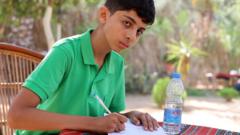In the heart of Gaza, where the echoes of sirens and the shadows of destruction loom large, the lives of three children—Zakaria, Abdullah, and Renad—offer a poignant glimpse into the resilience of youth amid chaos. Zakaria, an 11-year-old boy, has become a fixture at al-Aqsa hospital, bravely aiding paramedics as they receive casualties from the ongoing war. Instead of learning in a classroom, Zakaria has witnessed the horror of war firsthand, claiming to have seen over 5,000 bodies since the conflict ignited.
"I must have seen at least 5,000 bodies. I saw them with my own eyes," he recalls solemnly. Tragically, several of his friends have perished in the violence, heightening the weight of his grim reality. As ambulances incessantly arrive at the hospital, Zakaria can be found clearing pathways, carrying the wounded, and even cleaning the bloodied equipment.
In an effort to capture the human experience of this conflict, filmmakers Yousef Hammash and Jamie Roberts followed Zakaria and other children for their BBC documentary, "Gaza: How to Survive a Warzone." This project was developed in the wake of restrictions on international journalists, relying instead on local cameramen to gather crucial footage and firsthand accounts.
Abdullah, 13, serves as the narrator of the film. Once a student at the British school in Gaza, he strives to maintain his education despite the challenges of the war. Meanwhile, 10-year-old Renad has taken to TikTok—performing a cooking show with her sister. Their channel has garnered over a million followers, providing a moment of carefree creativity amid the stark realities they face daily.
Through the lens of these children's experiences, the film delves into their struggles for education, sustenance, and routine amidst devastation. The hospital, which has become a sanctuary for Zakaria, serves as a backdrop to his longing for normalcy and the chance to help others. Hospital staff have taken notice of his dedication, even crafting a miniature set of scrubs for him, symbolizing his desire to belong among the paramedics he admires.
Said, a paramedic, attempts to shield Zakaria from the harrowing realities of their work, encouraging moments of childhood, such as trips to the beach. Yet, the specter of violence hangs over them, raising concerns about Zakaria’s psyche and future. "I want to be a paramedic," he ultimately reveals, echoing a profound yearning for purpose in a world marred by conflict, while also expressing a desire to escape the devastation around him.
The documentary serves as a window into the lives of Gazan youth, illuminating their struggles and indomitable spirit. As the conflict remains unresolved, the stories of Zakaria, Abdullah, and Renad resonate—a testament to human resilience in the face of relentless adversity.



















